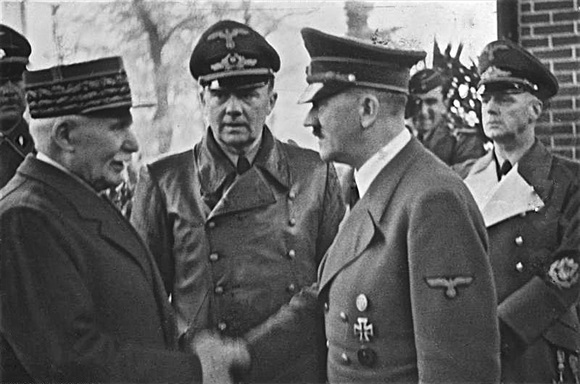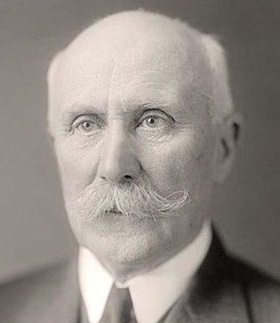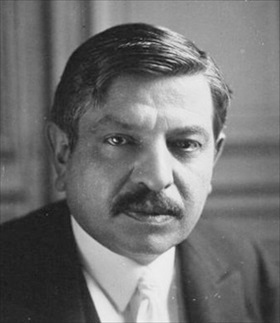HITLER, PÉTAIN PLEDGE COOPERATION
Montoire, German-Occupied France · October 24, 1940
After failing the day before to convince Spanish dictator Francisco Franco to bring his country into the war on the Axis side, Adolf Hitler met with 84‑year-old Marshal Philippe Pétain and Pierre Laval, head of state (chef de l’État Français) and deputy leader of Vichy France, respectively, on this date in 1940 in the relatively isolated town of Montoire-sur-le-Loir, about 80 miles south of Paris. The meeting between the German and French leaders had been suggested two days earlier by Laval, an outspoken proponent of state collaboration with Nazi Germany, even pushing his view on Pétain that the Marshal formally enroll France in the Tripartite (Axis) Pact. Hitler’s charm offensive took place in his private coach just outside the town’s train station. For Pétain and Laval it was important to define a new relationship with Germany, even if it was an unequal one. On Pétain’s agenda was a reduction in the war indemnity France was obliged to pay the victorious Germans. Pétain also wanted Hitler to release over two million French prisoners of war who were being used as forced laborers to enforce German terms on France. Pétain and Laval were assured that France could expect concessions if an acceptable agreement on collaboration was negotiated. The famous handshake between Hitler and Pétain was photographed, and Nazi propaganda made much use of the photo to gain support from French civilians. A week later Pétain made collaboration Vichy state policy, declaring on French radio: “I enter today on the path of collaboration” (“J’entre aujourd’hui dans la voie de la collaboration”), and inviting his countrymen to join him on the journey. Five years later, in 1945, Pétain was handed over to the provisional French government headed by his wartime nemesis, Gen. Charles de Gaulle. Pétain’s speech to the French nation was one of the crimes leveled against him at his postwar treason trial. In his defense, the increasingly senile 89‑year-old Petain claimed to have done his best to protect the French people from the worst excesses of the Nazis, but he was sentenced to death along with Prime Minister Pierre Laval. Later Pétain, but not Laval, was given a reprieve by de Gaulle. In 1951 at age 95 Pétain died in his island prison, stripped of all military ranks and honors except that of Marshal of France.
[amazon_carousel widget_type=”ASINList” width=”600″ height=”200″ title=”Recommended Reading” market_place=”US” shuffle_products=”False” show_border=”False” asin=”1574885987,0199254575,141281152X,1403970114,1565843231,0393319113,1848851456,1616086009,0195090527,0199970866″ /]
Hitler and Vichy French Collaborators Philippe Pétain and Pierre Laval
 |
Above: On October 24, 1940, Philippe Pétain and Pierre Laval conducted an historic meeting with Hitler at Montoire, France, where the two French leaders discussed the possible directions of Franco-German collaboration. For Pétain and Laval, collaboration with Germany was the means by which their country might secure a better place in Europe once peace had broken out, as well as safeguard Vichy’s sovereignty over the German-occupied north and western French zones and the unoccupied southern (Vichy) zone.
 |  |
Left: Philippe Pétain (1856–1951) was a French general who reached the distinction of Marshal of France, later authoritarian Chief of State of Vichy France from 1940 to 1944. His wartime collaboration with Nazi Germany resulted in his postwar conviction for treason (by a one-vote majority) and death sentence. Gen. Charles de Gaulle, who was President of the Provisional Government of the French Republic, commuted the sentence to life imprisonment owing to Pétain’s advance age and his military contributions in World War I. Pétain was exiled to an island prison off the French Atlantic coast, where he died at the age of 95.
![]()
Right: Pierre Laval (1883–1945) was four-time Prime Minister of France, twice serving the Vichy regime as head of government. An admirer of totalitarian government, Laval embraced the cause of fascism, the destruction of democracy, and the dismantling of the democratic Third Republic. He signed orders sanctioning the deportation of foreign Jews from French soil to the Nazi death camps. On September 7, 1944, what was left of the Vichy government moved to Southwestern Germany. After falling into U.S. hands, Laval was turned over to the French government in late July 1945. Tried for high treason and violating state security, he was convicted and sentenced to death. Only eleven days after the verdict and after a failed attempt at suicide, Laval was executed, half-unconscious and vomiting, by a firing squad on October 15, 1945.
Pétain Speaking of His Historic Meeting at Montoire, Where He Entered into an Agreement to Collaborate with the German Occupiers (in French)
![]()

 History buffs, there is good news! The Daily Chronicles of World War II is now available as an ebook for $4.99 on Amazon.com. Containing a year’s worth of dated entries from this website, the ebook brings the story of this tumultuous era to life in a compelling, authoritative, and succinct manner. Featuring inventive navigation aids, the ebook enables readers to instantly move forward or backward by month and date to different dated entries. Simple and elegant! Click
History buffs, there is good news! The Daily Chronicles of World War II is now available as an ebook for $4.99 on Amazon.com. Containing a year’s worth of dated entries from this website, the ebook brings the story of this tumultuous era to life in a compelling, authoritative, and succinct manner. Featuring inventive navigation aids, the ebook enables readers to instantly move forward or backward by month and date to different dated entries. Simple and elegant! Click 











